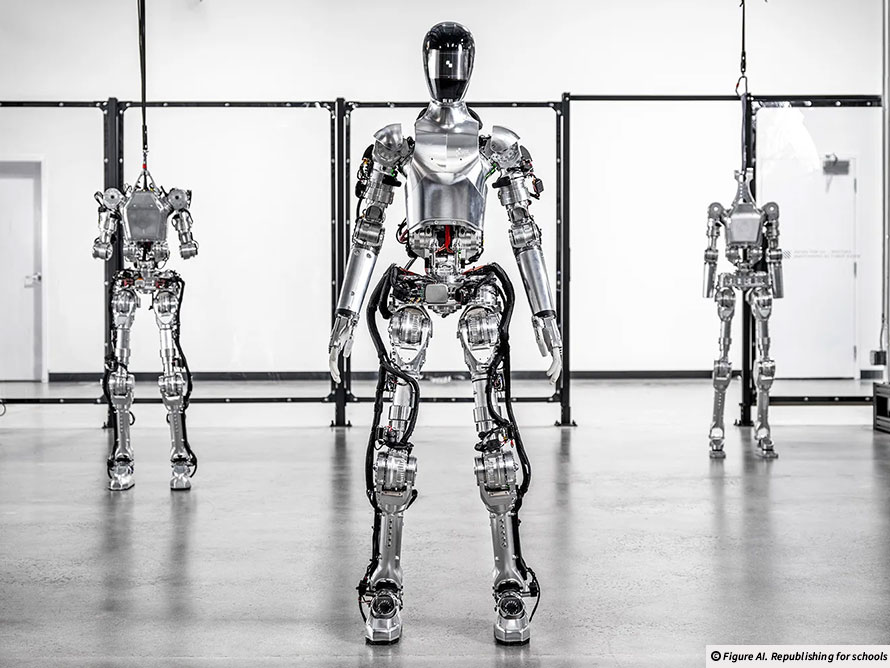Should we fear an AI future? Millions of jobs might be at risk as tech giants invest in a company making robot labourers to complete everyday tasks.
Droid factory to churn out humanoid workers
Should we fear an AI future? Millions of jobs might be at risk as tech giants invest in a company making robot labourers to complete everyday tasks.
Rise of the machines
Imagine visiting your favourite cafe. Fresh pastries are on display and the smell of coffee fills the air. However, when you reach the counter to make an order, the baristaA person who makes and serves coffee for a living. has been replaced by a metal robot.
An American company called Figure has created an AIA computer programme that has been designed to think. -powered robot able to complete human tasks. Their androidA robot that looks like a human being (in science fiction). can already make a cup of coffee.
Figure made the news last week after it raised £534m from some of the world's biggest tech companies. According to CEOThe Chief Executive Officer is the highest ranking person in a company. They are responsible for making decisions about the company's future. Brett Adcock, their robots "can do basically everything a human can do."1
The robots are designed to perform tasks too dangerous for humans. However, some think the android will take over most human jobs.
Because AI is moving so quickly, nobody can predict the future. But many scientists worry about an event known as "the Singularity", when technological growth is out of control and cannot be reversed.
Those in favour of AI argue that change is inevitableUnavoidable. . Technology has always altered the workforce, but humans have learnt to adapt. As computer scientist Ray Kurzweil argues: "We have already replaced all human employment several times."2
Following the Industrial RevolutionA period of sudden, rapid industrialisation that transforms a country from an agricultural to an industrial economy., many formerly hand-made goods were instead created by machines. But countries became richer as different jobs were invented to support the new economy.
Critics point out, once AI technology is used in all parts of the economy, it may be hard to regain control. In the worst-case scenario, an intelligent system might decide that humans were a threat.
Recent history has shown that computers can save lives. The pharmaceuticalRelating to medical drugs or the process of making them. company Moderna used AI to design their Covid-19 vaccineA biological preparation that improves immunity to a particular disease. A vaccine typically contains an agent that resembles a disease-causing microorganism, but in its weakest form. in record time.3
A machine is as good or bad as the people using it. However, the more laws we have to control AI, the better the chance it will improve all our lives.
Should we fear an AI future?
Yes: Intelligent robots will replace people with a cheaper alternative that never stops working. Companies might benefit, but society will surely suffer.
No: Androids can free workers from having to perform dull or dangerous tasks. Instead, they could focus on creative activities and personal relationships, leading to happier lives.
Or... Disruption from technology is inevitable. However, we can use legislationLegislation consists of a law or laws passed by a government. to make sure that intelligent machines are working with, rather than against, humanity.
Keywords
Barista - A person who makes and serves coffee for a living.
AI - A computer programme that has been designed to think.
Android - A robot that looks like a human being (in science fiction).
CEO - The Chief Executive Officer is the highest ranking person in a company. They are responsible for making decisions about the company's future.
Inevitable - Unavoidable.
Industrial Revolution - A period of sudden, rapid industrialisation that transforms a country from an agricultural to an industrial economy.
Pharmaceutical - Relating to medical drugs or the process of making them.
Vaccine - A biological preparation that improves immunity to a particular disease. A vaccine typically contains an agent that resembles a disease-causing microorganism, but in its weakest form.
Legislation - Legislation consists of a law or laws passed by a government.
Droid factory to churn out humanoid workers
 New hires: Figure AI bots (above) won’t strike, take holidays, grumble or ask for tea breaks.
New hires: Figure AI bots (above) won’t strike, take holidays, grumble or ask for tea breaks. Glossary
Barista - A person who makes and serves coffee for a living.
AI - A computer programme that has been designed to think.
Android - A robot that looks like a human being (in science fiction).
CEO - The Chief Executive Officer is the highest ranking person in a company. They are responsible for making decisions about the company's future.
Inevitable - Unavoidable.
Industrial Revolution - A period of sudden, rapid industrialisation that transforms a country from an agricultural to an industrial economy.
Pharmaceutical - Relating to medical drugs or the process of making them.
Vaccine - A biological preparation that improves immunity to a particular disease. A vaccine typically contains an agent that resembles a disease-causing microorganism, but in its weakest form.
Legislation - Legislation consists of a law or laws passed by a government.
